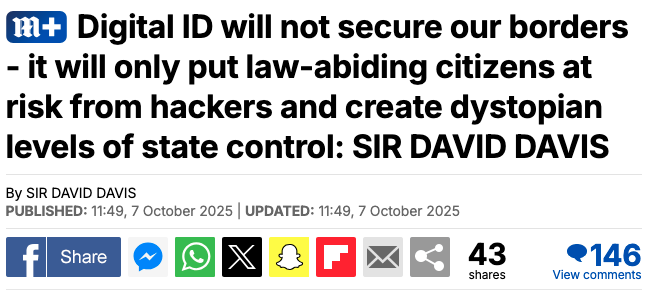The Facts
Right-Wing Bias Identified in Article
The article exhibits a strong right-wing bias, primarily through its alarmist language, focus on government overreach, and selective presentation of information to paint digital ID proposals in a negative light. The author, Sir David Davis, is a Conservative MP, and the publication, Daily Mail, is known for its right-leaning editorial stance. The title itself uses emotionally charged terms ("dystopian," "hackers," "state control") to immediately frame the digital ID as a threat.
Main Biased Arguments and Counter-Arguments
Biased Argument 1:
"Keir Starmer intends to stop illegal immigration by introducing digital ID cards. Any fool can see that won't work." & "Digital ID will not secure our borders, but will give future governments the capacity to carry out a virtual 'stop and search' on law-abiding citizens."
Counter-Argument:
Digital ID systems can significantly support immigration control by providing reliable verification of identity and immigration status for employment, housing, and public services. This approach complements border enforcement by making it harder for undocumented individuals to reside and work undetected, rather than replacing it entirely.
- **Fact 1:** Countries like Estonia successfully use digital ID for a wide range of public and private services, including identity verification, which aids in managing immigration by formalizing status checks. e-Estonia: e-ID card
- **Fact 2:** The UK government's own Digital Identity and Attributes Trust Framework acknowledges the role of digital identity in verifying "right to work" and "right to rent," key areas impacted by illegal immigration. GOV.UK: Digital Identity and Attributes Trust Framework
Biased Argument 2:
"It will give the state unchecked power to digitally strip citizens naked, exposing every part of their private lives to inspection by nameless and faceless bureaucrats."
Counter-Argument:
Well-designed digital ID systems prioritize privacy and individual control. They can implement "privacy-by-design" principles, allowing users to selectively disclose only the necessary information for a transaction (e.g., confirming "over 18" without revealing a date of birth). Robust legal frameworks and data protection laws (like existing UK data protection legislation) are crucial safeguards against "unchecked power."
- **Fact 1:** International regulations, such as the European eIDAS regulation, emphasize user control over data and selective disclosure of attributes to protect privacy. European Commission: eIDAS Regulation
- **Fact 2:** The UK's Digital Identity and Attributes Trust Framework outlines principles for user choice and control over personal data sharing within digital identity schemes. GOV.UK: Digital Identity and Attributes Trust Framework
Biased Argument 3:
"Today the risk of massive data loss is hundreds of times more damaging and thousands of times more likely. ... Starmer is now proposing a single point of access to all your data: tax records, health records, every interaction with the state. This creates what experts have called a 'honeypot' for cyber criminals. It is a certainty that both hackers and foreign states will target this system."
Counter-Argument:
While cybersecurity risks are inherent in any digital system, modern digital ID architectures can be designed with distributed or federated principles to avoid creating a single "honeypot." Data can remain with various trusted providers, with the digital ID serving as an authentication layer, not a centralized database holding all personal information. Continuous investment in robust cybersecurity measures and adherence to national and international security standards are critical for such systems. Past IT project failures, while unfortunate, inform better future design and implementation strategies.
- **Fact 1:** Many modern digital identity systems are designed using federated or decentralized architectures, meaning data is not stored in one central "honeypot" but remains with different verified entities, and the digital ID acts as a secure key for access. NIST: Digital Identity Guidelines
- **Fact 2:** The UK's National Cyber Security Centre (NCSC) provides extensive guidance and frameworks for securing digital services, which would apply to any national digital identity system to mitigate cyber threats. NCSC: Digital services security guidelines
Biased Argument 4:
"This scheme did not appear in Labour's manifesto. It does not carry any democratic mandate. Announced during Parliamentary recess to avoid proper scrutiny, it is not a policy of consent, but one of compulsion."
Counter-Argument:
Government and party policy proposals frequently evolve and are announced outside of formal election manifestos, particularly in response to emerging societal challenges or technological advancements. Parliamentary recess does not prevent future scrutiny; new proposals typically undergo extensive public consultation, parliamentary debate, and legislative processes when Parliament is in session, providing multiple avenues for democratic oversight. The nature of "consent" would be determined by the final legislative framework and public engagement processes.
- **Fact 1:** Policy-making processes in the UK often involve proposals and announcements that were not explicitly in a party's election manifesto, reflecting ongoing governance and adaptation to new issues. The Institute for Government: Policy making
- **Fact 2:** Any significant new legislation, including a national digital ID scheme, would be subject to a rigorous process of parliamentary scrutiny, including readings, committee stages, and public consultations, regardless of when it was first announced. The Parliament of the United Kingdom: Bills and Legislation
Biased Argument 5:
"Every British citizen already has a National Insurance number for that purpose... Are we seriously meant to believe that dodgy cash-in-hand businesses illegally paying immigrants below minimum wage will start demanding their digital IDs?"
Counter-Argument:
National Insurance numbers (NINs) are not designed as secure identity documents and are easily misused or faked for identity theft; they are primarily for tax and social security purposes. Employers are legally required to conduct robust right-to-work checks using original documents, not just NINs. A digital ID system could offer enhanced, cryptographically secured verification of identity and legal right-to-work status, making it significantly harder for *all* employers, including those operating illicitly, to exploit vulnerabilities in employment verification, thereby strengthening enforcement against illegal labor practices more broadly.
- **Fact 1:** National Insurance numbers do not serve as proof of identity or right to work in the UK. Employers must check specific primary documents to confirm an individual's right to work. GOV.UK: Right to work checks - an employer's guide
- **Fact 2:** Digital identity systems, particularly those incorporating verifiable credentials, can provide a higher level of assurance and real-time verification capabilities, enhancing efficiency and reliability of identity and status checks compared to traditional paper-based methods. World Economic Forum: Reimagining Digital Identity
Wondering what could drive such a misleading headline?

